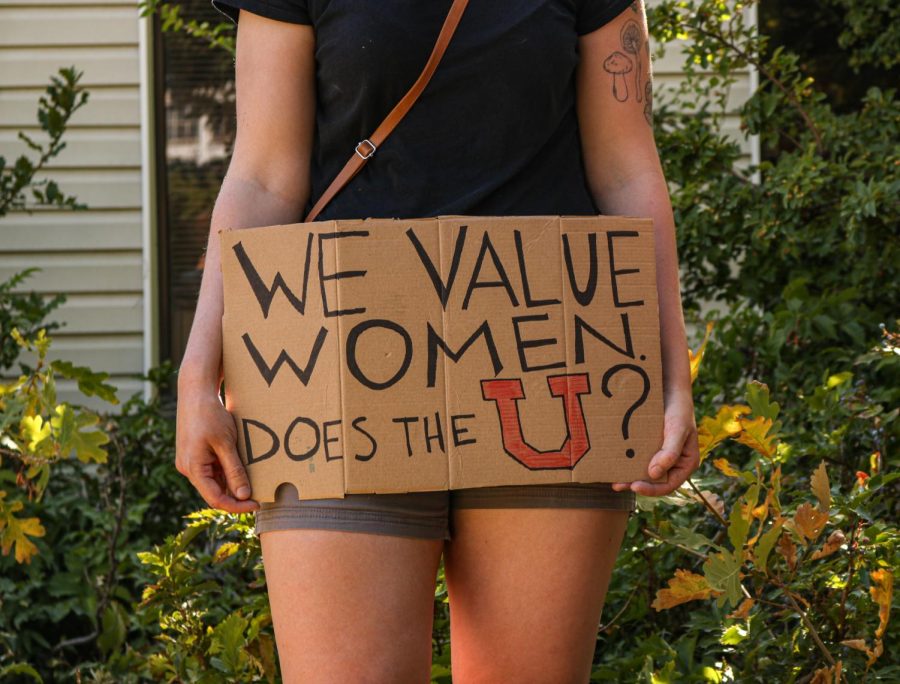Cushman: Listen to Students. Create a Safer Campus.
UnSafe U protesters gather at the Public Safety Building on the University of Utah campus in Salt Lake City to protest the actions of officers involved in the Lauren McCluskey case on Aug. 6, 2020.
September 16, 2020
In October of 2018, University of Utah student Lauren McCluskey was killed on campus, only one year after the on-campus murder of another student, ChenWei Guo. Both of these deaths shook students, especially McCluskey’s, as she had made multiple attempts to contact both government and university authorities about her attacker in the weeks leading up to her death. Student concerns about campus safety have justifiably increased over the past few years, but seeing the university’s mishandling of McCluskey’s case has undoubtedly exacerbated the existing problem.
The 2020 campus climate survey showed that most students who experienced stalking, harassment, domestic violence and assault did not report it to any U offices. Many students, myself included, are justifiably upset by this, without any real ways to hold the university responsible for its mistakes. Students would feel safer if they were able to hold university leadership accountable.
Young adults come to the University of Utah to receive an education. We pay to spend our time on a great campus, take important classes and learn in a positive environment. It is fair to expect safety to be included in that package, but the university has proven time and time again that it is unable to protect students.
Lauren McCluskey died because, despite calls to campus police by both her and her mother regarding her safety, the threat against her was never taken seriously. Not only that, but McCluskey was further victimized by a university police officer who showed off explicit pictures of her to a coworker. This pattern is not unique to McCluskey’s case. Investigations into the university’s police department after McCluskey’s death showed university police often failed to contact victims promptly, downplayed domestic violence cases on campus by neglecting to record all of them and treated potential rape victims in a hostile manner while providing few victim resources.
What happened to Lauren McCluskey speaks to a certain kind of culture among university leadership, one where crimes are ignored and victims are further victimized in pursuit of making the “old white men comfortable” and ensuring the school’s profitability. How can students trust leadership that has ignored victims for so long and shown that protecting the university is a higher priority than protecting students? If we ever want to restore trust, students need ways to hold university leadership accountable.
There are not many ways for students to make their voices about university leadership heard. We are not in charge of who runs our school, our colleges or our police department. ASUU is one of the few institutionalized ways that students can voice their opinions and directly impact the governing of our university. But when ASUU spoke out against the U’s dismissal of the McCluskey family’s lawsuit, the university failed to take any substantive action.
As changes to the university police department were made following Lauren McCluskey’s death, students were largely shut out of the decision-making process. The rigorous selection process the university used to hire a new police chief only involved students after options had been significantly narrowed down by university leadership and did so in a way not accessible to many students. The open campus forums held for the three finalists occurred in December 2019, at a time when many students would not be able to participate because they were preparing for and taking finals.
Regardless of intent, the university has excelled at making students feel cut out of decisions on campus safety. On a campus that has failed in so many high-profile ways, students need to have effective methods for holding university leadership accountable. The only way students will feel safe on this campus again is if they have a say in what campus safety looks like moving forward.
Students are facing new and different threats to our health and safety this year. We are trying to attend school in the midst of a global pandemic. Our school needs to rebuild trust with the student body to properly address this new threat to our safety. Students who do not trust their school will be less likely to follow its safety guidelines, which is critical as we try to safely attend class this year.
No student should feel alone and scared to ask for help if they are victimized. No student should feel as if they have nowhere to turn if they are hurt. Being scared negatively impacts our education, in turn negatively impacting the university. Campus safety is important to us as students because it directly impacts our health and wellbeing, but it should be important to university leadership too — it impacts the reputation of their institution. If we want to address campus safety effectively, student voices need to be heard and university leadership needs to be held accountable for the ways they have let us down.








